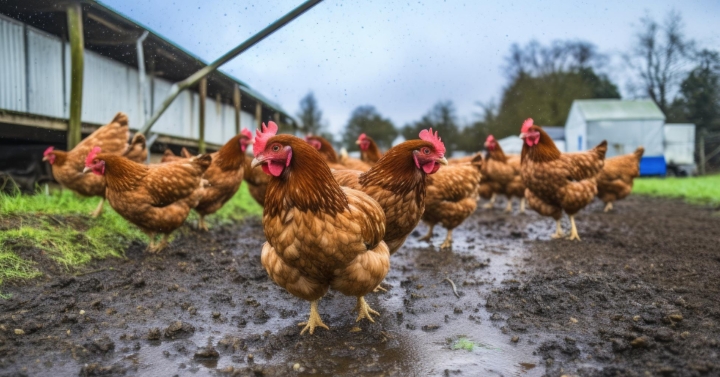
Guarding Your Flock: How to Protect Chickens During Typhoon
Typhoon season poses challenges for every aspect of life, including the safety and well-being of your flock. Chickens in the rain face risks like flying debris, flooding, and stress from the storm’s noise and chaos.
Ensuring their shelter is secure, coop structures are reinforced, and loose objects are secured can mitigate these dangers. By adopting these proactive measures, you’re not only safeguarding your chickens in the rain but also promoting their overall health and well-being during these turbulent times.
Preparing the Coop for Typhoon Impact
To weather-proof your chicken coop, knowing the basics of creating a sound structure is essential. Reinforce coop structures to withstand strong winds by using sturdy materials and proper construction techniques. Additionally, secure loose objects in and around the coop that could become projectiles in high winds, reducing potential hazards.
Providing ample bedding inside the coop not only offers insulation but also ensures your feathered friends have a comfortable space to seek shelter. By following these steps in weather-proofing your chicken coop, you’re taking a proactive approach to safeguard your flock during typhoon season.
Creating a Safe Haven Inside the Coop
Creating a safe haven within the coop is paramount when wondering what to do with chickens when it rains. Designate a sheltered area where your chickens can seek refuge from the elements. Ensure proper ventilation that allows fresh air circulation while keeping rainwater out. Adequate lighting is crucial, not only for their comfort but to reduce stress during potential power outages.
By offering a well-thought-out sanctuary inside the coop, you’re providing your chickens with a place where they can find comfort and security during rainy weather. This thoughtful approach ensures their well-being and promotes their ability to weather the storm with resilience and ease.
Stocking Up on Essential Supplies
When wondering what to do with chickens when it rains, stocking up on essential supplies becomes crucial. Make sure you have ample feed and water reserves to sustain your flock through the typhoon.
Additionally, gather first aid supplies to address potential injuries caused by the storm. Keep flashlights, batteries, and other emergency items easily accessible to ensure you’re prepared for any situation.
By stocking up on high-quality chicken feed like PILMICO’s Poultry Express, you’re not just ensuring your flock’s health but their strength and immunity as well. Poultry Express feeds are enriched with a “Vitamin C Boost” formula, helping your chickens regain depleted vitamins and enhancing their overall resilience.
Being prepared with the right supplies is a proactive way to ensure your chickens’ well-being during inclement weather.
Implementing Evacuation Plans
Implementing a well-thought-out evacuation plan is essential for your chickens’ safety during a typhoon. Identify a safe indoor space where your flock can be temporarily relocated, ensuring that it’s protected from the elements.
Make sure this area is well-ventilated and free from potential hazards. Have transportation containers readily available to move your chickens swiftly and safely. By having a clear evacuation strategy in place, you’re ensuring that your feathered friends can be moved to a secure location without delay, minimizing their exposure to harsh weather conditions.
Being proactive and prepared with an evacuation plan is a crucial aspect of safeguarding your flock’s well-being during turbulent times.
Monitoring Weather Updates
Monitoring weather updates is a crucial step in safeguarding your chickens during a typhoon. Staying informed about the storm’s progress enables you to make timely decisions for your flock’s safety.
Utilize weather apps and alerts to track changing conditions in real time, helping you stay ahead of any potential risks. Remember that weather patterns can shift rapidly, so be prepared to adjust your plans based on the latest forecasts.
By staying proactive and well-informed, you’re better equipped to make informed choices that ensure your chickens’ well-being during inclement weather. Your vigilance and adaptability can make a significant difference in keeping your feathered companions safe and secure.
During and After the Typhoon
When the typhoon’s intensity momentarily lessens, if safe, check on your chickens. Inspect their well-being, ensuring they’re not showing signs of distress. If possible, provide fresh water and reassure them, reducing their stress during this turbulent time.
Once the storm has passed, it’s essential to carefully inspect the coop and its surroundings for damages. Look for structural issues, leaks, or any debris that may have blown in. Address any immediate concerns to ensure your chickens have a safe environment to return to.
Examine your flock for any signs of injuries or stress caused by the typhoon. Look for any physical injuries or unusual behavior. If you notice anything concerning, consult a veterinarian for guidance on how to address their needs and promote their recovery.
By being attentive during and after the typhoon, you’re taking the necessary steps to ensure your chickens’ well-being. Your vigilance and care can make a significant difference in helping them weather the storm and return to normalcy as smoothly as possible.
Safeguarding Your Feathered Companions
As we conclude our journey through the strategies to protect chickens during typhoon season, let’s recap the pivotal takeaways we’ve uncovered. From fortifying coop structures and providing shelter to monitoring weather updates and post-storm assessments, each step plays a vital role in ensuring your chickens’ safety.
Remember, early preparation and a well-executed plan are your allies in safeguarding your flock. By taking proactive measures and staying informed, you’re not just mitigating risks but providing them the best chance to weather the storm with resilience.
As typhoon season approaches, prioritize your chickens’ safety. Your dedication to their well-being speaks volumes about your role as a caretaker. By implementing the insights shared in this guide, you’re not just guarding your flock; you’re nurturing a relationship built on care, trust, and resilience. Your feathered companions will undoubtedly thank you for your efforts, standing as a testament to the strength of your bond.





